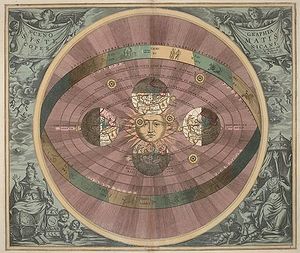Portal:Philosophy of science
|
| Article · Category · Index · WikiProject |
|
The 'philosophy of science' is the branch of philosophy that studies the philosophical assumptions, foundations, and implications of science, including the formal sciences, natural sciences, and social sciences. In this respect, the philosophy of science is closely related to epistemology and philosophy of language. Note that issues of scientific ethics are not usually considered to be part of the philosophy of science; they are studied in such fields as bioethics and science studies. In particular, the philosophy of science considers the following topics: the character and the development of concepts and terms, propositions and hypotheses, arguments and conclusions as they function in science.The manner in which science explains natural phenomena and predicts natural occurrences. The types of reasoning that are used to arrive at scientific conclusions; the formulation, scope, and limits of scientific method. The means that should be used for determining when scientific information has adequate objective support, and the implications of scientific methods and models, along with the technology that arises from scientific knowledge for the larger society.
Lua error in package.lua at line 80: module 'Module:Box-header/colours' not found. In 1610, Galileo published his Sidereus Nuncius (Starry Messenger), describing the surprising observations that he had made with the new telescope. These and other discoveries exposed major difficulties with the understanding of the heavens that had been held since antiquity, and raised new interest in radical teachings such as the heliocentric theory of Copernicus. In reaction, many maintained that the motion of the Earth and immobility of the Sun were heretical, as they contradicted some accounts given in the Bible as understood at that time. Galileo's part in the controversies over theology, astronomy and philosophy culminated in his trial and sentencing in 1633 on a grave suspicion of heresy. Lua error in package.lua at line 80: module 'Module:Box-header/colours' not found. In astronomy, heliocentrism is the belief that the Sun is at the center of the Universe and/or the Solar System. The word is derived from the Greek (Helios = "Sun" and kentron = "Center"). Historically, heliocentrism is opposed to geocentrism and currently to modern geocentrism, which places the earth at the center. Lua error in package.lua at line 80: module 'Module:Box-header/colours' not found.
Lua error in package.lua at line 80: module 'Module:Box-header/colours' not found. Descartes is often regarded as the first modern thinker to provide a philosophical framework for the natural sciences as these began to develop. In his Meditations on First Philosophy he attempts to arrive at a fundamental set of principles that one can know as true without any doubt. To achieve this, he employs a method called methodological skepticism: he doubts any idea that can be doubted in order to acquire a firm foundation for genuine knowledge. Initially, Descartes arrives at only a single principle: thought exists. Thought cannot be separated from me, therefore, I exist. Most famously, this is known as cogito ergo sum, ("I think, therefore I am"). Template:/box-header Portal:Philosophy of science/Did you know Template:/box-footer Anti-psychiatry • Determinism • Empiricism • Epistemology • Evolution • Free will • History of science • Holism • Ontology • Philosophy of biology • Philosophy of physics • Pseudoscience • Reductionism • Skepticism • Sociology of scientific knowledge • Vitalism • Rationalism • Proposition • Positivism • Objectivity • Knowledge Further Reading
Journals
|
- What are portals?
- List of portals
- Featured portals








